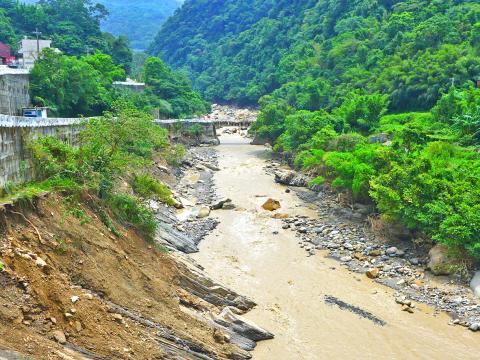Taipei Mayor Ko Wen-je (柯文哲) yesterday attributed the turbidity of tap water in areas of the city following Typhoon Soudelor to poor soil and water conservation efforts upstream of Nanshih River (南勢溪), saying that water transferred to purification plants had given rise to the problem.
The poor quality of tap water sparked waves of panic buying in Taipei and New Taipei cities over the weekend.
Asked whether the Taipei City Government had been slow to take action to address the tainted water, Ko said that the city government is not at fault, as it has carried out extensive soil and water protection measures along the Beishih River (北勢溪), which flows into the reservoir.

Photo: Lee Ya-wen, Taipei Times
“This is not the first time Taipei has been hit by a typhoon of this magnitude, but the city’s raw water turbidity surpassed 30,000 nephelometric turbidity units [NTU] over the weekend, indicating a problem,” Ko said.
The city would ask the central government to inspect areas upstream of the Nanshih River and make the necessary improvements to the city’s water supplies, he said.
Taipei Water Department Commissioner Chen Chin-hsiang (陳錦祥) said that no water had been supplied from Feitsui Reservoir (翡翠水庫) over the weekend, as city policy stipulates that water from Nanshih River be tapped first, and that water from the reservoir serve as a complement to cover the city’s water needs when necessary.
He said that as Nangshih River is governed by the Taipei Water Management Office, overseen by the Water Resources Agency, the city government can only offer the office suggestions on how to boost conservation efforts along the river.
He said the highest raw water turbidity the city had previously seen was 12,000 NTUs, recorded following Typhoon Soulik in 2013, which the department was then able to treat and continue the supply of clean water.
However, the department faced “great difficulty” treating contaminated water following Typhoon Soudelor, when water turbidity shot up from 10,000 NTUs at 7am on Saturday to 30,000 NTUs at 8am, forcing the departments in Chang Hsing, Gongguan and Jhihtan to limit water tapped from the Nanshih River, Chen said.
He said poor soil and water conservation measures led to numerous mudslides during Typhoon Soudelor, which likely contaminated water in the river, adding that access to New Taipei City’s Wulai District (烏來) — located downstream of the river — was still blocked as a result of mudslides as of press time last night.
Water quality was back to normal yesterday, with raw water and tap water turbidity dropping below 200 NTUs and 1 NTU respectively, Chen said.
However, Taipei Department of Health Secretary-General Hsu Chao-chen (許朝程) urged the public to boil water five minutes longer than they normally would over the next couple of days to eliminate the potentially pathogenic chloroform often associated with impurities in water.

SECURITY: As China is ‘reshaping’ Hong Kong’s population, Taiwan must raise the eligibility threshold for applications from Hong Kongers, Chiu Chui-cheng said When Hong Kong and Macau citizens apply for residency in Taiwan, it would be under a new category that includes a “national security observation period,” Mainland Affairs Council (MAC) Minister Chiu Chui-cheng (邱垂正) said yesterday. President William Lai (賴清德) on March 13 announced 17 strategies to counter China’s aggression toward Taiwan, including incorporating national security considerations into the review process for residency applications from Hong Kong and Macau citizens. The situation in Hong Kong is constantly changing, Chiu said to media yesterday on the sidelines of the Taipei Technology Run hosted by the Taipei Neihu Technology Park Development Association. With

‘FORM OF PROTEST’: The German Institute Taipei said it was ‘shocked’ to see Nazi symbolism used in connection with political aims as it condemned the incident Sung Chien-liang (宋建樑), who led efforts to recall Democratic Progressive Party (DPP) Legislator Lee Kun-cheng (李坤城), was released on bail of NT$80,000 yesterday amid an outcry over a Nazi armband he wore to questioning the night before. Sung arrived at the New Taipei City District Prosecutors’ Office for questioning in a recall petition forgery case on Tuesday night wearing a red armband bearing a swastika, carrying a copy of Adolf Hitler’s Mein Kampf and giving a Nazi salute. Sung left the building at 1:15am without the armband and apparently covering the book with a coat. This is a serious international scandal and Chinese

A US Marine Corps regiment equipped with Naval Strike Missiles (NSM) is set to participate in the upcoming Balikatan 25 exercise in the Luzon Strait, marking the system’s first-ever deployment in the Philippines. US and Philippine officials have separately confirmed that the Navy Marine Expeditionary Ship Interdiction System (NMESIS) — the mobile launch platform for the Naval Strike Missile — would take part in the joint exercise. The missiles are being deployed to “a strategic first island chain chokepoint” in the waters between Taiwan proper and the Philippines, US-based Naval News reported. “The Luzon Strait and Bashi Channel represent a critical access

COUNTERINTELLIGENCE TRAINING: The ministry said 87.5 percent of the apprehended Chinese agents were reported by service members they tried to lure into becoming spies Taiwanese organized crime, illegal money lenders, temples and civic groups are complicit in Beijing’s infiltration of the armed forces, the Ministry of National Defense (MND) said in a report yesterday. Retired service members who had been turned to Beijing’s cause mainly relied on those channels to infiltrate the Taiwanese military, according to the report to be submitted to lawmakers ahead of tomorrow’s hearing on Chinese espionage in the military. Chinese intelligence typically used blackmail, Internet-based communications, bribery or debts to loan sharks to leverage active service personnel to do its bidding, it said. China’s main goals are to collect intelligence, and develop a